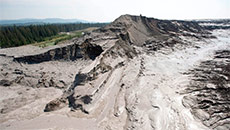CALGARY — At an energy conference last month, Enbridge Inc. CEO Al Monaco was bemused so many people turned out to hear what he and other pipeline bosses had to say.
"We never used to get invited anywhere," he quipped, drawing chuckles from the crammed hotel ballroom in downtown Calgary.
Once considered a rather ho-hum line of business, pipelines dominated much of the public discourse in 2014. In recent years, the debate has spread beyond the direct environmental impacts of putting steel in the ground into broader issues around anything from global climate change to First Nations rights.
Although proposed projects from Alberta's oilsands to the east, west and U.S. Gulf Coasts made some progress over the past year, their prospects remain far from certain.
A near-halving in crude prices over the past six months has led to widespread belt-tightening in the oilpatch, calling into question future demand for new transport infrastructure. But that's just one of the litany of challenges for pipeline builders seeking "social licence" to build their projects — measures that go beyond simply obtaining the necessary government permits.
Enbridge (TSX:ENB), for example, has had a federal permit to build its multibillion-dollar Northern Gateway pipeline to the West Coast in-hand since the summer, subject to 209 conditions.
But shovels are not going to hit the ground any time soon for the 525,000-barrel-per-day conduit that would connect oilsands crude to the West Coast port of Kitimat, B.C., and from there to energy-hungry Asian markets.
Rather, Enbridge has been "re-engaging" with B.C. First Nations along the route, many of which have been outspoken opponents of the project, concerned a potential spill would destroy the water on land on which they rely.
Pipelines have also been at the centre of a larger public debate about fighting climate change. And Monaco told the panel it's been very "strategic" on the part of environmental groups that aim to slow oilsands expansion, and the higher greenhouse gas emissions that would follow, by preventing the crude from getting to market.
"Would you rather go after 100 upstream companies or 100 refineries?" said Monaco. "No — it makes a lot of sense to go after the midstream part of the value chain."
There's been increasing frustration from environmental groups that the National Energy Board does not consider the upstream environmental impacts from pipeline projects, such as oilsands emissions, but weighs the spinoff economic benefits.
The argument that oilsands development will continue to grow with or without any given pipeline project doesn't wash with Keith Brooks, clean economy director at Environmental Defence.
"Clearly, pipelines are one of the constraints on the growth of the sector," he said.
"That actually has an impact on how quickly that sector can expand and therefore an impact on the emissions associated with that."
Meanwhile, fellow pipeline giant TransCanada Corp. (TSX:TRP) is aiming to link up to 1.1 million barrels a day of Alberta crude to export terminals and refineries in Quebec and New Brunswick through its $12-billion Energy East pipeline. For about two thirds of the way, an existing segment of cross-Canada natural gas pipe will be converted to oil service, with new pipe to be built through Quebec and New Brunswick.
The company filed its regulatory application to the National Energy Board in October, with each 30,000-page copy filling 68 binders in 11 boxes. Once viewed as one of the more politically palatable proposals on the table, opposition is quickly mounting to Energy East.
The pushback has centred on anything from beluga habitat in Quebec's St. Lawrence River, where plans to build one export terminal have been put on hold, to the impact of the pipe conversion on gas consumers in Central Canada.
At the same time, TransCanada continues to wait for a U.S. permit to build its long-delayed Keystone XL pipeline after six frustrating years. Recent signals from U.S. President Barack Obama have been far from encouraging. He's cast doubts on the project's job-creating potential and has described the project as an export pipeline that won't bring any meaningful benefits to the U.S.
TransCanada has spent a lot of time rebutting opponents' claims about its projects. But the export claim been more sticky than others, and it's one that's been particularly annoying to CEO Russ Girling.
"As they've thrown this things at us, nothing has stuck. But the notion that somehow Canada is going to ship its oil through the United States and send it to China has resonated," he said in a recent interview.
"It's an issue that people are fearful of in the United States, so we've seen those that are opposed to the project sort of fabricate this notion."
Industry and government efforts to build public support for pipelines hasn't been going well, said Michael Cleland, Nexen executive in residence at the Canada West Foundation.
"It seems no matter where you look, what you've got is a lot of discord and a lot of potential for that to grow," he said.
Cleland, a former assistant deputy minister in the federal Natural Resources department, said there's a "breakdown of fundamental trust of the various institutions that are in play here."
"People feel that they can't get in the door, that they can't get their voices heard on all sorts of things, including what are you doing about greenhouse gas management and what are you doing about long-term regional land-use planning and so on," he said.
Industry seems to now understand how important it is to engage at the community level early on, said Cleland.
"The locally affected communities are the ones where you're most likely to find people who care about it, but are also in a position to see both the benefits and the potential risks," he said.
Back at last months' pipeline panel discussion, Kinder Morgan Canada's president Ian Anderson was briefly interrupted by a sound from his phone.
"My pocket is beeping and I'm hoping it's not something I don't want it to be in Burnaby," he said.
As the pipeline bosses were giving their assessment of the industry's future, police had just broken up protests on Burnaby Mountain, near Vancouver, against survey work Kinder Morgan was undertaking in preparation for a planned near-tripling of capacity of its Trans Mountain pipeline.
"On a project that we're trying to undertake and others are undertaking, you are always in somebody's political cycle," said Anderson.
"You're always in a campaign mode, it doesn't matter if it's municipal, provincial or federal. That's just going to be part of life."






